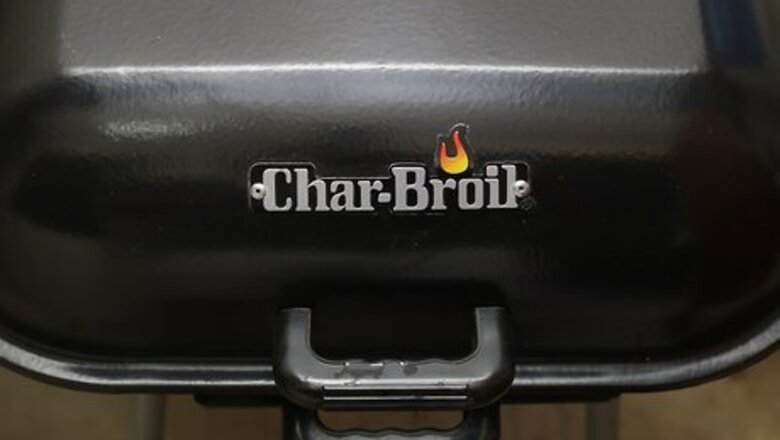
views
Preparing the Steak

Choose the right type of grill for your meal. A great steak speaks for itself -- it needs little seasoning other than some salt and pepper and is packed with flavor. The right grill will help accentuate this flavor. That said, any grilled steak will be perfect if handled correctly, so there is no "wrong" choice. Propane: Gas grills add little flavor to the meat, letting the steak stand on its own. They are the fastest and easiest to control for cooking, making them perfect for larger meals or last-minute grills. Charcoal: The "classic" BBQ flavor, these hard little bricks heat up relatively quickly and give rich, smoky tones to the meat. Make sure they are all white-hot before cooking on them to get the best bbq steak. Wood-fire: The hardest to light and manage but the choice of top barbecuers around the world, wood chips have the best flavor. Can be combined with charcoal to get the best of both worlds.
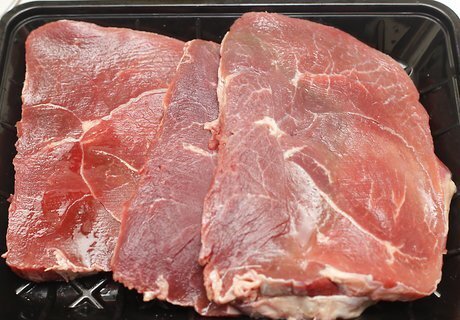
Purchase bright red, freshly cut steaks from your local butcher. The best meat should still be a bright, vibrant red color. Marbling, or the white streaks of fat, also indicate a more flavorful and juicy steak. If the steak is maroon or brown colored, skip it for something fresher. Just ask if your butcher will slice off a fresh cut for you. Some ideas for good steak cuts include: High-End Cuts Ribeye, Strip, Tenderloin, T-Bone, Delmonico Incredible Budget Cuts: Hanger, Skirt, Tri-tip, Ranch, Sirloin, or Flank
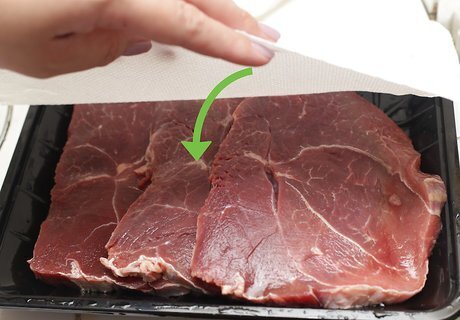
Let the steak sit, covered, at room temperature for 5-10 minutes before cooking. This prevents you from throwing a cold steak on a hot grill, which greatly alters cook times and makes it harder to get a well-seared outside and completely cooked middle. Bigger steaks, those thicker than 1 ⁄2 in (3.8 cm), may need 15 minutes or so. EXPERT TIP Alex Hong Alex Hong Executive Chef & Restaurant Owner Alex Hong is the Executive Chef and Co-Owner of Sorrel, a New American restaurant in San Francisco. He has been working in restaurants for over ten years. Alex is a graduate of the Culinary Institute of America, and has worked in the kitchens of Jean-Georges and Quince, both Michelin-starred restaurants. Alex Hong Alex Hong Executive Chef & Restaurant Owner Our Expert Agrees: I think the most important thing in grilling a steak is to let it come as close to room temperature as possible. Once you've done that, you can put it in a pan with some butter, then move it to a low and slow oven, or you can grill it.
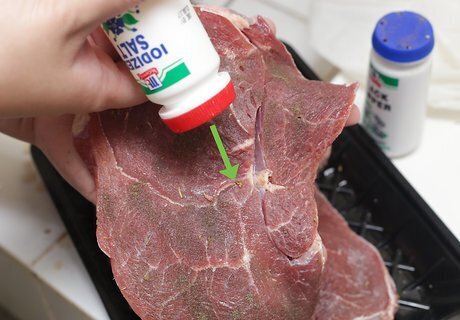
Rub the steak with salt and pepper, massaging it gently into the meat. While some chefs love seasoning, most steakhouses won't touch a piece of good meat with anything more than simple salt and pepper. Use the largest grains of salt you can -- kosher or course-grained is best -- and liberally cover the meat. Then touch it up with pepper, adding as much as you personally enjoy (but nowhere near as much as the salt). Think of the salt as light snow on a dark road. You can still see the asphalt, but the "snow" (salt) covers the majority of it. Be sure to get both sides and the edges of the steak as well.
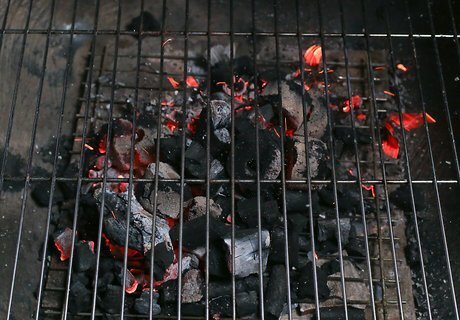
Pre-heat the grill on medium-high heat. If you're using a charcoal or wood grill, you'll need to get it started roughly 30-40 minutes before eating. A propane grill likely only needs 5-10 minutes if you leave the cover on.The thinner the steak the hotter the grill should be, and keeping track of this temperature is important. However, you can check temperature even if you don't have a thermometer with a simple trick: ⁄2 inch (1.3 cm) thick: Heat up to 425–450 °F (218–232 °C), so that you can't keep your hand over the grill for more than 3 seconds. ⁄4 to 1 inch (1.9 to 2.5 cm) thick: Get the grill to 360–400 °F (182–204 °C). You shouldn't be able to keep your hand over the grill 4-5 seconds. 1 to 1 ⁄2 inch (2.5 to 3.8 cm) thick: Get the grill to 325–360 °F (163–182 °C), as you don't want to overcook the outsides before the center finishes. Your hand could only take about 5-6 seconds above the grill. Thicker than 1 ⁄2 inch (3.8 cm): Stick to 325 °F (163 °C), and know that you'll likely need to flip the steak once more than you would otherwise to avoid burning the outsides.
Grilling the Steak
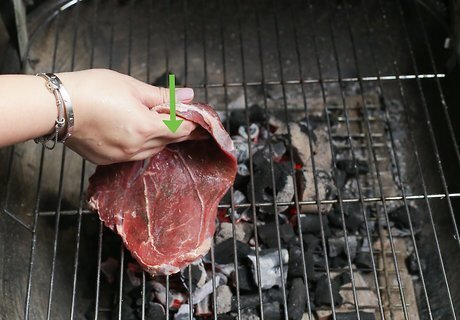
Once the grill is heated up, slap the meat directly above the heat source. If you're using propane, lay the steak on the grate so that it is right above the flames. Once you've set it down, try not to move it much. If you want nice charred grill lines you'll need to leave the steak place. If you want the classic criss-cross grill lines, turn the steak 45-degrees with a pair of tongs halfway through cooking.
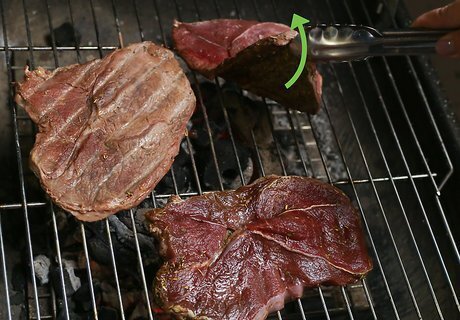
Cook each side of the steak for 3-7 minutes, depending on the desired doneness and how thick the steak is. For a thinner steak, flip around the low end of the following times. For a thicker steak, turn at the higher end. If the steak is pink when you turn it then the grill is not hot enough -- raise the heat and leave it flipped over. Rare: grilled for roughly 3 minutes a side (raise the heat 25-50 degrees before beginning) Medium rare: grilled for roughly 5 minutes a side. Medium steaks: grilled for roughly 7 minutes a side. Well done steaks: grilled for 10 minutes each side, then removed to indirect heat to finish cooking.
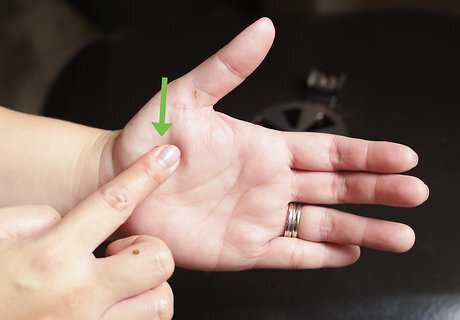
Learn the "palm test" to check your steaks internal temperature without cutting into it. You shouldn't cut a steak until 4-5 minutes after it comes off the heat, as the juices inside re-absorb in the meat as it cools, leading to a juicier cut. So how do you test the insides? The trick is literally in the palm of your hand. Hold your hand open, then touch the tip of your thumb to the tip of your index finger. With your other hand, touch the fleshy part of your palm under your thumb -- this feels just like a medium rare steak. Each finger combination mimics a certain cook temperature: Rare: Don't touch any fingers -- it feels just like the fleshy part under your thumb. (Internal Temp: 130-135°F) Medium Rare: Touch your index finger to your thumb. (Internal Temp: 130-135°F) Medium: Touch your middle finger to your thumb. (Internal Temp: 140°F) Medium Well: Touch your ring finger to your thumb. (Internal Temp: 155°F) Well Done: Touch your pinky to your thumb. (Internal Temp: 165°F°)
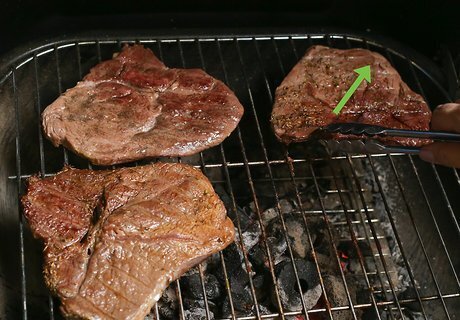
Let the steaks finish cooking on indirect heat if the outside is done but the center needs some time. Move the steaks away from the flame, burner, or hot coals. If you have a higher rack on your grill, place the meat up here. Cover the grill and let the heat slowly cook the steak without allowing the outsides to burn. You shouldn't have to leave the steak for more than 1-2 more minutes unless you want it well done. Be sure to flip the steak halfway through cooking, even when cooking indirectly.
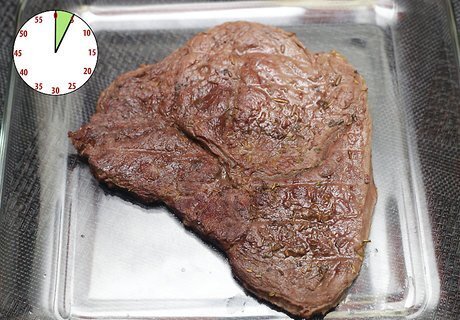
Let the steak sit for at least 5-10 minutes before serving. This is called letting the meat "stand." As it cooks, steak releases juices that keep it tender and delicious. As it cools, the meat reabsorbs these juices. However, if you cut the meat right after it comes off the grill the juices will spill out, lost forever. Instead, cover lightly with aluminum foil and let the beef sit. When you do cut the steak, try to cut with the grain. This means along with the small, strands of meat you can see running up and down the steak. You may also wish to familiarize yourself with the best way to carve your specific cut of beef. For example, there may be subtle differences in how you'd cut tri-tip versus T-bone steaks.
Adding New Flavors
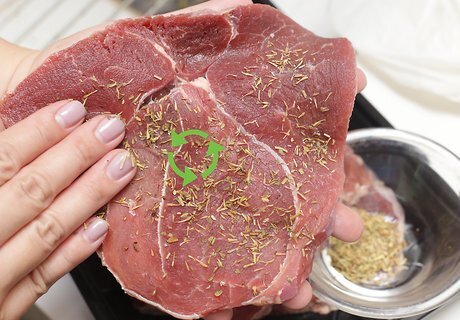
Use a dry rub or seasoning instead of straight salt and pepper. You can purchase many of these rubs are sold pre-mixed right out the store, allowing you to mix new flavors into your meats. However, you can also make your own easily, starting with salt and pepper before adding 1/8 teaspoon of each ingredient from the following lists: Dried thyme, oregano, rosemary, and garlic powder Onion powder, chili powder, paprika, and garlic powder Chili powder, cayenne, Mexican oregano, paprika, garlic powder/salt Brown sugar, paprika, chili pepper, garlic, and ground coffee.
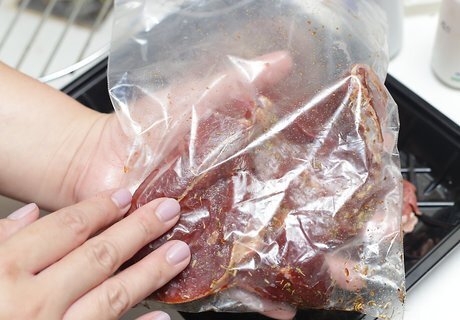
Try out a wet marinade for a softer, more-flavorful steak. You'll need to get this started the night before, but all it requires is mixing the steaks with the following ingredients in a freezer bag and refrigerating overnight (at the very most). The acidic ingredients in each marinade will break down some of the meat proteins for a more tender cut. 1/3 cups of soy sauce, lemon juice, olive oil, Worcestershire sauce. Then add 1–2 tablespoons (14.8–29.6 ml) garlic powder, dried basil, parsley, rosemary, and crushed black pepper. 1/3 cup red wine vinegar, 1 cup vegetable oil, 1/2 cup soy sauce, 3 tablespoons (44.4 ml) Worcestershire, 2 tablespoons Dijon mustard. Then add 2-3 cloves minced garlic and 1 tablespoon (14.8 ml) ground black pepper.
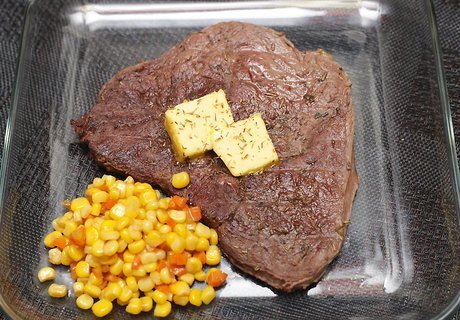
Slather your steak with a pat of butter for a rich steakhouse meal. Rich golden butter will seep into the meat to help keep it juicy, tender, and flavorful. For an even better finish, try to make a simple compound butter by mixing 5 tablespoons (73.9 ml) of room-temperature butter with one of the following ingredients. Then, before serving, re-chill the butter in the fridge so that it is hard. 1 teaspoon fresh thyme, sage, rosemary, basil, chopped. 2-3 cloves of minced garlic or 1 teaspoon garlic powder. 1 teaspoon chili powder, cayenne pepper, cilantro, and/or lime juice
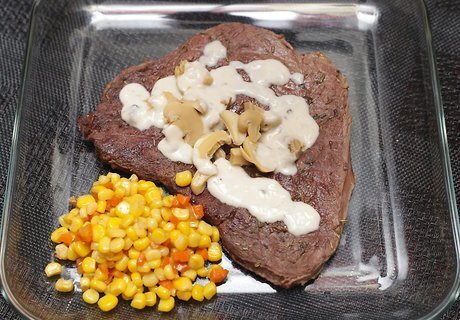
Top your steak with something special to make a meal of it. The right topping can take your steak to the next level, adding a bit of crunch, a savory compliment, or a little bit of sharp, pungent flavor to balance the buttery delicious meat. Try out: Onions Peppers Mushroom Crispy fried onions Bleu cheese Fresh parsley Dollop of sour cream A quick pan sauce.



















Comments
0 comment